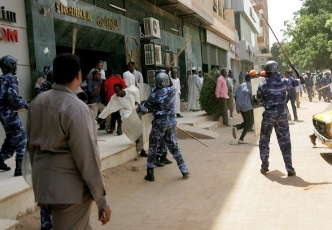Sudan rejects US criticism of crackdown on protests
June 27, 2012 (KHARTOUM) – The Sudanese ministry of foreign affairs has rejected in the strongest terms a statement in which the U.S. Department of State criticized Khartoum’s crackdown on ongoing protests , saying it is “a blatant interference” in the country’s domestic affairs.

Police and security forces resorted to violence stamp out the protests in which hundreds of people burned tires, blocked roads and chanted slogans calling for the downfall of the regime.
Rights groups say scores of protesters have been detained and mistreated while in custody.
US State Department spokeswoman, Victoria Nuland, on Tuesday said that “arresting and mistreating protesters” will not solve Sudan’s economic and political problems.
“There have been reports of protesters being beaten, imprisoned and severely mistreated while in government custody. We call for the immediate release of those detained for peaceful protest,” she said.
This is the second comment from the U.S. government on the unfolding events in Sudan. On 20 June, four days after the protests started, the US State Department said it was “deeply concerned” by the crackdown of Sudanese authorities on peaceful demonstrators.
Reacting to the US comments, the official spokesperson of Sudan’s foreign ministry, Al-Obaid Adam Marawih, on Wednesday issued a statement saying that Khartoum rejects US “blatant interference” in Sudan’s internal affairs.
“The USA is not qualified to advise on such an issue because it continues bombing civilians in different parts of the world and it cracked down on demonstrators on Wall Street” he said.
Marawih called on Washington to deal with Sudan according to factual information rather than double-standards and political propaganda.
He stated that the Sudanese government is committed to the right of peaceful protests and the right to freedom of expression as guaranteed by the country’s constitution. He however added that the government also has an obligation to carry its duties in protecting public and private properties as well as responding to the “saboteurs” who exceed the limits of peaceful expression to transgressing on lives and properties.
Sudan blames part of its economic woes on US sanctions imposed on Khartoum since 1997 over alleged ties to terrorist groups.
Britain has also joined the US in expressing concern over Khartoum’s reaction to the protests.
Henry Bellingham, UK Minister for Africa, called for the “immediate release” of detained activists and for security forces to “act with restraint.”
In Sudan, meanwhile, the authorities continued their violent crackdown on demonstrations.
Eye witnesses told Sudan Tribune that anti-riot police on Wednesday fired heavy teargas to disperse hundreds of university students who took to the streets in the eastern town of Kassala holding banners bearing pictures of their detained colleagues and chanting slogans against price rises.
Human Rights Watch (HRW), a New York-based advocacy group, said this week that Sudan must end crackdown on protesters, release detained activists and allow journalists to report freely on the demonstrations.
Sudanese authorities on Tuesday expelled Salma El Wardani, the Egyptian female correspondent of Bloomberg News, for covering the protests.
Sudanese officials including President Al-Bashir sought to downplay the protest movement saying it is not the same as the Arab Spring revolutions which toppled long-standing regime in the Middle East.
Al-Bashir said the demonstrations were the work of “few agitators.”
(ST)
